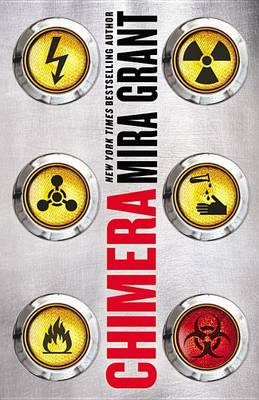Reviewed by Quirky Cat on
If you haven’t read the first two novels in this series (Parasite, Symbiont) then you should stop reading this review now, because it is absolutely going to have spoilers for those books.
Chimera brings a conclusion to the outbreak, as well as finally resolving all of the subplots that have been up in the air. It gave me a lot of peace to see some of these events resolved, though there are one or two things I wouldn’t have minded seeing included.
I know that Mira Grant probably could find more to write about in this world if she so chose. But honestly, I think it ended at a good point here. I’d rather see a series end when it should, then have it go on longer than it can sustain (we’ve all seen what can happen there).
Warnings: If you’ve read the previous novels, then you’re already aware of the steps and extremes the military branch here has been willing to take. This includes forced isolation and testing, as well as forcing people into camps. These camps are only for the people parasite free, but they’re not exactly great places to be. And again, they’re not voluntary. Some of the descriptions here can be a little rough to hear.
Chimera was the perfect conclusion to the Parasitology series. Though honestly, I am very sad to see it go. It was a lot of fun to read this series, and I will miss it. I loved Sal and all of her stubbornness and quirks. I loved the outbreak caution-less science created, and I loved all of the ethical debates this series raised.
Looking back on this novel, it feels like it contained so much more than just the conclusion to the series. Sal went through a lot in this novel. She seems to always be going through a lot, doesn’t she? She bounced from one location to the other, sometimes voluntarily, sometimes not.
But that’s nothing compared to some of the emotional turmoil she had to go through here. She had to put up with inhumane conditions, accept the way people viewed her, and accept the loss of loved ones along the way. It couldn’t have been easy for her.
There was one moment in this novel that I really loved. Up until now, Sal had been skirting the line between the two major sides. She didn’t want anybody to die – human, sleepwalker, or chimera. She had naively been hoping that people could just accept the chimeras for who they are. There was a moment here, where the finally realized why that wasn’t going to be so easy for the humans. Why they couldn’t easily forgive and forget, where the bodies of their loved ones were concerned. It showed a lot of growth on Sal’s part, and honestly, I think it was a perspective she needed to have.
Her realization helped to further show us just how far her father, Colonial Mitchell, was willing to go to make amends. He went above and beyond, no matter how you look at it. Yeah, he did some pretty awful things in the past. But he didn’t have to agree to do any of the things asked for here. His wife certainly would not have, we know that much. But he did, and he did it all with grace. So Sal wasn’t the only one that grew during the course of this series.
Chimera did a wonderful job of wrapping up all of the major plot points that have been running throughout this series. I won’t say that everything is back to normal by the end –I don’t know if that will ever be possible. But we do get answers to all of our major questions. And we get a sense of satisfaction as well, so I certainly can’t complain.
My only complaint, and it is a minor one, is that (spoiler warning) Dr. Banks didn’t get what he deserved. I would love to complain more about this…but honestly? It kind of makes sense. Real life doesn’t tie things up in a nice bow. Sometimes the bad guy does get away with things. Especially when he is a rich scientist with lots of government connections. It stinks, but it happens.
I’m sad that the series is over, but it ended with no loose ends, so I’m content. At least I have plenty of other series from Mira Grant/Seanan McGuire to move onto next.
For more reviews, check out Quirky Cat's Fat Stacks
Reading updates
- Started reading
- 22 February, 2019: Finished reading
- 22 February, 2019: Reviewed
